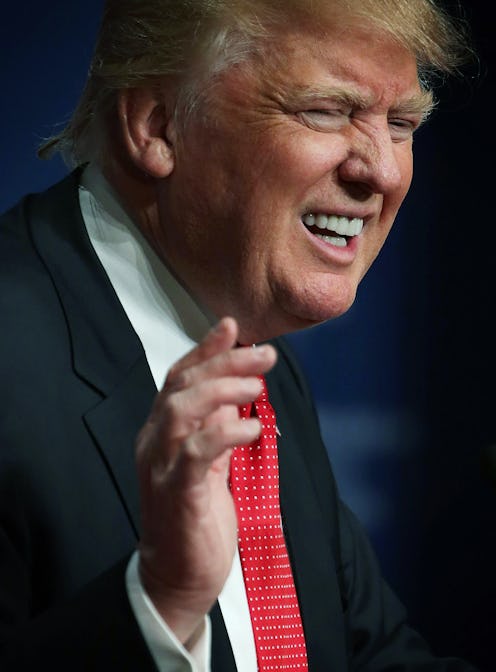News
Will The GOP Really Be Loyal To Trump If He Wins?
On Monday, Republican presidential frontrunner Donald Trump offered a deeply inflammatory proposal: banning all Muslims from entering the United States until "our country's representatives can figure out what is going on." It's drawn widespread condemnation from liberals and some conservatives alike, and on Tuesday, the White House joined in the chorus of disapproval, with press secretary Josh Earnest stating, "And the fact is what Donald Trump said yesterday disqualifies him from serving as president. And for Republican candidates for president to stand by their pledge to support Mr. Trump, that in and of itself is disqualifying." That raises the question: Will the Republican loyalty pledge stand if Trump is nominated?
After all, it's one thing for a politician to say that they'll support a Trump campaign in the general election, and another thing to actually do it. In any scenario in which Trump actually secures the Republican nomination, the amount of animus that'll be felt toward him in establishment circles figures to be intense. We're already at the point of GOP leaders plotting to derail his candidacy. Even if a rival candidate pledged to support whoever won the nomination, would that hold true if the winner were Trump?
If you're wondering just how many of the Republican candidates pledged to support the Republican nominee, the answer doesn't reflect well on the field. As Fusion's Katie McDonough notes, during the first Republican presidential debate — at the very top of the show, in fact — Fox News' Bret Baier got everyone on the record.
Is there anyone on stage, and can I see hands, who is unwilling tonight to pledge your support to the eventual nominee of the Republican Party, and pledge to not run an independent campaign against that person. Again, we're looking for you to raise your hand now if you won't make that pledge.
Trump was the only person on stage to raise their hand, and that came as no surprise. While it might not come across just from reading it, the question was clearly aimed entirely at Trump. By virtue of his immense wealth and belligerent nature, many in the GOP feared (and continue to fear) that an independent bid could be in the cards if Trump flamed out in the primaries. Baier's question was intended to expose this in the eyes of Republican voters. Remember, Trump initially wouldn't rule out a third-party run if the GOP rejected him, although he did ultimately sign a pledge promising that he wouldn't.
Unfortunately for the party, however, kicking things off that way is now cutting against them, rather than against Trump. When Chris Christie, Scott Walker, Ben Carson, Marco Rubio, Jeb Bush, Mike Huckabee, Ted Cruz, Rand Paul, and John Kasich didn't raise their hands, that meant they were pledging to "support the eventual nominee of the Republican Party." This question wasn't asked of the undercard debaters — Carly Fiorina, Rick Perry (now dropped out), Lindsay Graham, Bobby Jindal, Jim Gilmore, George Pataki, and Rick Santorum.
But many of the candidates, like Fiorina, also signed the pledge before or after the fact. As The New York Times details, each and every Republican candidate has signed the pledge, meaning that they're all expected to fall in line behind Trump if he wins the nomination.
But here's the caveat: Nothing actually happens to you if you break the pledge! And obviously, nobody knows who anyone else votes for — secret ballot and all that. Politicians lie, misdirect, and distort all the time, sometimes with great consequences. Considering that the consequences for betraying the pledge and shunning Trump could realistically be nil, and how hostile things have become between him and the party's more mainstream apparatus, it's entirely possible that any of the candidates could turn their backs on their past promise.
That's hardly the measure of political courage, however. It would be courageous to renounce the pledge now, and make it clear in no uncertain terms that a President Trump would be unacceptable, even if he is a Republican. But so far, nobody's gone that distance, despite the primary field offering some stinging criticisms of Trump over the past couple of days.
